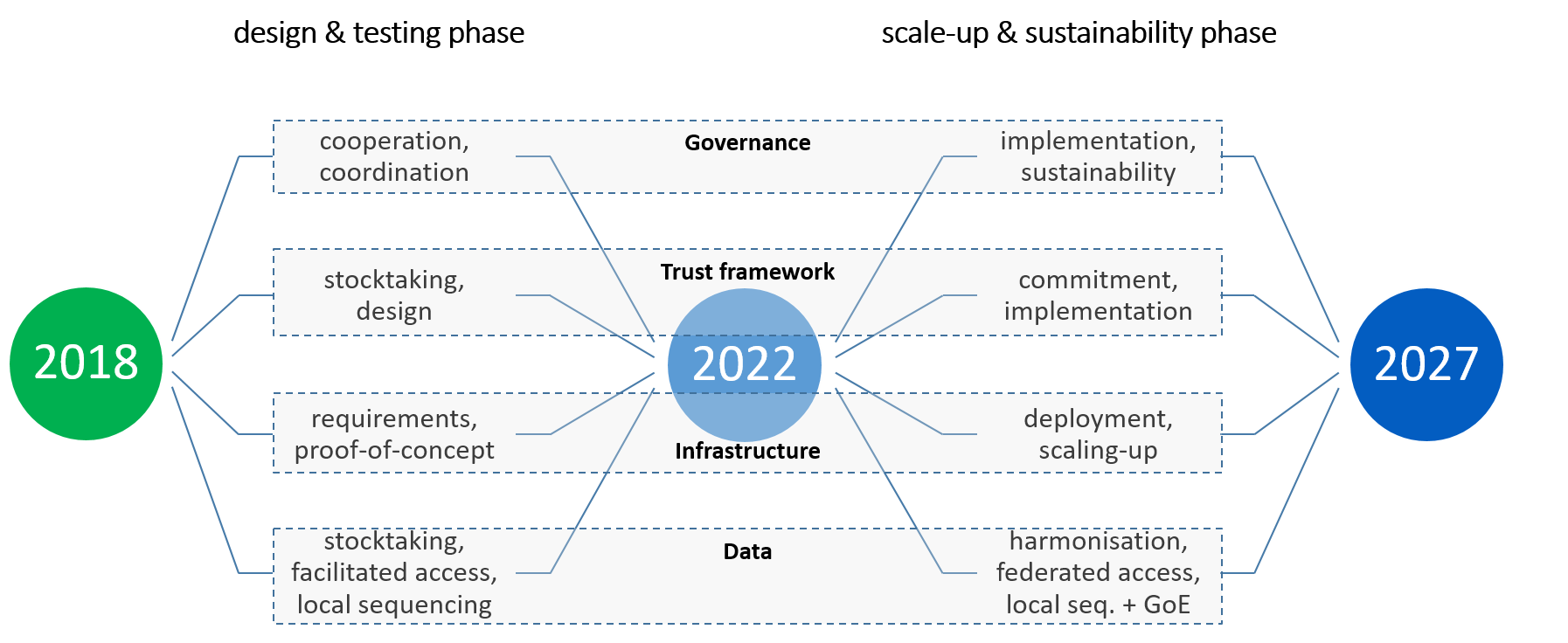To address the health challenges facing the population of South Africa, scientists have looked for solutions in their genetics, leading to the launch of an initiative called precision medicine. This approach designs therapeutic interventions based on individual characteristics, rather than applying standardized protocols to all patients.
For millennia, humanity has waged a constant battle against disease. As researchers delve into patterns of response, a fundamental question arises: why do some individuals recover quickly while others suffer prolonged illness? Furthermore, why do symptoms and responses seem to be remarkably consistent across generations?
These questions become increasingly pressing as the situation becomes more complex, particularly in South Africa, which is burdened by heavy health challenges. The country faces high rates of infectious diseases such as HIV and tuberculosis, alongside non-communicable diseases like cancer, diabetes, and cardiovascular issues, the latter of which are rising due to lifestyle changes and socio-economic factors. Additionally, maternal and child health is threatened by limited access to services and inadequate nutrition, while road accidents and violence contribute to rising morbidity and mortality rates.
The South African Medical Research Council has decided to leverage the country's unique characteristics by integrating genomic research into everyday medical practices. To achieve this, it has collaborated with the Department of Science and Innovation and MGI, a leading company in DNA sequencing technologies, to introduce precision medicine—also known as personalized medicine—into approved medical practices through the development of high-quality products tailored to the African context.
Precision medicine recognizes the uniqueness of each individual, taking into account factors such as their genetic makeup, lifestyle, environment, and health history to design tailored treatments. For instance, instead of using conventional chemotherapy for a cancer patient, precision medicine identifies specific genetic mutations in the tumour, allowing targeted therapies to focus on those mutations and attack cancerous cells while preserving healthy tissues. This approach also addresses the variability in drug metabolism and pharmacogenomics, acknowledging that our responses to medication doses can differ due to genetic variations. Consequently, understanding genetic factors can help reduce complications.
Understanding genetic diversity in South Africa is crucial for several reasons. Africa is the cradle of the vast human spectrum, with its genetic richness surpassing that of any other continent. Other population groups are merely branches of the immense African diversity, shaped by historical population dynamics, migrations, and genetic adaptations in response to varied climates and diets, as well as exposure to infectious diseases. In Africa, the rates of linkage disequilibrium—an important feature in population genetics describing the non-random associations between different genetic traits—are lower. This means that mapping disease-related variants will be more accurate and reliable. Therefore, by studying the distinctive genetic traits of ethnic groups native to Africa, we can gain holistic insights into human evolution, adaptation, and susceptibility to diseases.
To leverage this capability, partners needed to establish a robust, high-throughput, and cost-effective molecular profiling pipeline to enable in-house research. The project adopted a strategic health partnerships model, fostering cross-border collaborations through initiatives like the EU’s Precision Medicine for Africa program. This facilitated knowledge exchange and capacity building, while the EU-Africa Personalized Medicine Consortium (Horizon 2020) helped bridge the knowledge gap between Africa and Europe, mapping a personalized medicine roadmap by addressing needs, introducing technological expertise and funding, and stimulating local research and innovation.
As with any major undertaking, the implementation of genomic medicine in Africa faces significant challenges. A historical underinvestment in genomic research has left a substantial gap, meaning that treatments developed elsewhere may not be fully effective for African populations and could even lead to adverse outcomes. However, advancements in technology are making drug development more accessible and efficient, while African nations are increasingly investing in capacity building and infrastructure to enable researchers to map the continent's diverse genetic landscape.
As researchers work to decode DNA, they encounter new variants known as variants of unknown significance, which are genetic changes that may or may not be associated with disease. Their efforts may also lead to incidental findings—unexpected discoveries, whether benign or harmful. This presents ethical challenges and raises questions about how to handle genetic information responsibly and transparently. To address these issues, it is essential to utilize genetic counselling to help patients understand the results and their implications.
Furthermore, the healthcare system will require extensive reforms, substantial research funding, and seamless integration of precision medicine into existing workflows.
This approach mitigates adverse drug reactions, improves outcomes, and contributes to health equity, addressing these intertwined health crises.
Through collaboration and joint efforts, South Africa is developing a comprehensive and advanced genomic infrastructure at minimal cost.
Understanding the African genome will not only enhance local healthcare but also position South Africa as a global leader in genomic research. Its impact will extend beyond the country, generating new insights into human diversity, evolution, and diseases, while paving the way for a healthier future.
References:
- https://www.news-medical.net/news/20230504/The-African-Personalized-Medicine-Agenda.aspx
- https://www.glopid-r.org/articles-newsletter/the-south-african-medical-research-council-samrc/
- https://www.samrc.ac.za/sites/default/files/2023-05/PrecisionMedicine.pdf
- https://www.euafrica-permed.eu/wp-content/uploads/2022/02/South-African-Precision-Medicine- Program.pdf
- https://www.ncbi.nlm.nih.gov/pmc/articles/PMC2953791/#:~:text=Africa%20is%20an%20important%20region,phenotypic%20variation%20in%20African%20populations.
- https://www.samrc.ac.za/research/extramural-research-units/precision-and-genomic-medicine
- https://journals.co.za/doi/pdf/10.10520/EJC-114a603d90
- https://www.ncbi.nlm.nih.gov/pmc/articles/PMC10546210/






